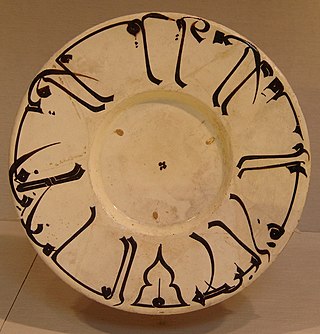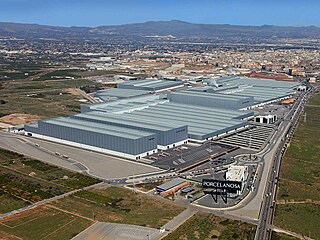
Delftware or Delft pottery, also known as Delft Blue or as delf, is a general term now used for Dutch tin-glazed earthenware, a form of faience. Most of it is blue and white pottery, and the city of Delft in the Netherlands was the major centre of production, but the term covers wares with other colours, and made elsewhere. It is also used for similar pottery, English delftware.

Earthenware is glazed or unglazed nonvitreous pottery that has normally been fired below 1,200 °C (2,190 °F). Basic earthenware, often called terracotta, absorbs liquids such as water. However, earthenware can be made impervious to liquids by coating it with a ceramic glaze, and such a process is used for the great majority of modern domestic earthenware. The main other important types of pottery are porcelain, bone china, and stoneware, all fired at high enough temperatures to vitrify. End applications include tableware and decorative ware such as figurines.

Islamic pottery occupied a geographical position between Chinese ceramics, and the pottery of the Byzantine Empire and Europe. For most of the period, it made great aesthetic achievements and influence as well, influencing Byzantium and Europe. The use of drinking and eating vessels in gold and silver, the ideal in ancient Rome and Persia as well as medieval Christian societies, is prohibited by the Hadiths, with the result that pottery and glass were used for tableware by Muslim elites, as pottery also was in China but was much rarer in Europe and Byzantium. In the same way, Islamic restrictions greatly discouraged figurative wall painting, encouraging the architectural use of schemes of decorative and often geometrically patterned titles, which are the most distinctive and original speciality of Islamic ceramics.

Kütahya is a city in western Turkey which lies on the Porsuk River, at 969 metres above sea level. It is the seat of Kütahya Province and Kütahya District. Its population is 263,863 (2022). The region of Kütahya has large areas of gentle slopes with agricultural land culminating in high mountain ridges to the north and west.

Mintons was a major company in Staffordshire pottery, "Europe's leading ceramic factory during the Victorian era", an independent business from 1793 to 1968. It was a leader in ceramic design, working in a number of different ceramic bodies, decorative techniques, and "a glorious pot-pourri of styles - Rococo shapes with Oriental motifs, Classical shapes with Medieval designs and Art Nouveau borders were among the many wonderful concoctions". As well as pottery vessels and sculptures, the firm was a leading manufacturer of tiles and other architectural ceramics, producing work for both the Houses of Parliament and United States Capitol.

Ceramic glaze, or simply glaze, is a glassy coating on ceramics. It is used for decoration, to ensure the item is impermeable to liquids and to minimise the adherence of pollutants.

Glaze defects are any flaws in the surface quality of a ceramic glaze, its physical structure or its interaction with the body.
Jordan Phosphate Mines (JPMC) is a mining company based in Amman, Jordan. The company operates 3 mining facilities in Jordan and a chemical manufacturing complex in Aqaba. The company is listed on the Amman Stock Exchange's ASE Weighted Index as "JOPH".

Pilkington's Lancastrian Pottery & Tiles was a manufacturer of tiles, vases and bowls, based in Clifton near Pendlebury, Lancashire, England. The company was established in 1892 at Clifton Junction, alongside Fletcher's Canal. The company employed talented designers, the most famous of whom was Charles Voysey. Production of art pottery was stopped at the end of the 1930s, although tile production continued. Today the site is occupied by Pilkington's Group Plc.
Cerâmica de Valadares is a Portuguese company which produces sanitary ware and ceramic fittings. Cerâmica de Valadares' factory is located in the parish of Valadares, in the city Vila Nova de Gaia and was founded on 25 April 1921.

Michał Sołowow is a Polish billionaire businessman and rally driver. His industrial group has 18 production plants in 8 countries and sells products in more than 60 countries on six continents and has over 16,000 employees.

E. Bon Holdings Limited is a public company listed in the Hong Kong Stock Exchange and is also known as one of the major architectural hardware, bathroom, and kitchen and furniture suppliers in Hong Kong.

Franciscan Ceramics are ceramic tableware and tile products produced by Gladding, McBean & Co. in Los Angeles, California, US from 1934 to 1962, International Pipe and Ceramics (Interpace) from 1962 to 1979, and Wedgwood from 1979 to 1983. Wedgwood closed the Los Angeles plant, and moved the production of dinnerware to England in 1983. Waterford Glass Group plc purchased Wedgwood in 1986, becoming Waterford Wedgwood. KPS Capital Partners acquired all of the holdings of Waterford Wedgwood in 2009. The Franciscan brand became part of a group of companies known as WWRD, an acronym for "Wedgwood Waterford Royal Doulton." WWRD continues to produce the Franciscan patterns Desert Rose and Apple.

Catalina Pottery is the commonly used name for Catalina Clay Products, a division of the Santa Catalina Island Company, which produced brick, tile, tableware and decorative pottery on Santa Catalina Island, California. Catalina Clay Products was founded in 1927. Gladding, McBean & Co. acquired all of the assets of the company in 1937 and moved all production to its Franciscan dinnerware division in Los Angeles.

California pottery includes industrial, commercial, and decorative pottery produced in the Northern California and Southern California regions of the U.S. state of California. Production includes brick, sewer pipe, architectural terra cotta, tile, garden ware, tableware, kitchenware, art ware, figurines, giftware, and ceramics for industrial use. Ceramics include terra cotta, earthenware, porcelain, and stoneware products.

Porcelanosa Group is a Spanish manufacturer, distributor and retailer of ceramic tiles. Products include ceramic, porcelain fittings, wall tiles, floor tiles, wood parquet, hardwood, natural stone, mosaics, kitchens, sanitary ware, brassware, bathtubs, shower trays, hydro massage cabins and columns, bathrooms, accessories, and bedroom furniture.

Malibu Potteries was a ceramic tile manufacturer in Malibu, California. Malibu Potteries was founded by Rhoda May Knight Rindge in 1926. A fire devastated the company 30 September 1931, and the company closed in 1932. Tile designs included influences the styles of Moorish, Egyptian, Mayan and Saracen cultures. Many of the tile designs were geometric. The company was known for their tile murals consisting of tiles with peacocks and other birds. The company also produced decorated tiles for floors in the style of a laid-out Persian rug. May Rindge's daughter's house, the historic Adamson House, has many examples of the tile produced by Malibu Potteries.
Bangladesh Insulator and Sanitaryware Factory Limited is a Bangladesh government owned ceramics and sanitary ware manufacturing company. It manufactures items such as commode, basin, etc. It is sister concern of the state owned Bangladesh Chemical Industries Corporation and is classified as a statutory organization.

Royal Ceramics Lanka PLC branded as Rocell, is a Sri Lankan holding company and is also engaged in manufacturing ceramic tiles and bath ware. The company was founded in 1990 and in 1994, it was listed on the Colombo Stock Exchange. The company is one of the constituents of the S&P Sri Lanka 20 Index. LMD, a Sri Lankan business magazine placed the company 38th in the LMD 100, a list of leading listed companies in Sri Lanka. Brand Finance ranked 74th amongst the 100 most valuable brands in Sri Lanka.
Kale Group is an industrial conglomerate with headquarters in Istanbul, Turkey. Established in 1956, the company's primary activities are in ceramics, building chemicals, logistics, defenseand aviation industry in 2015.
















